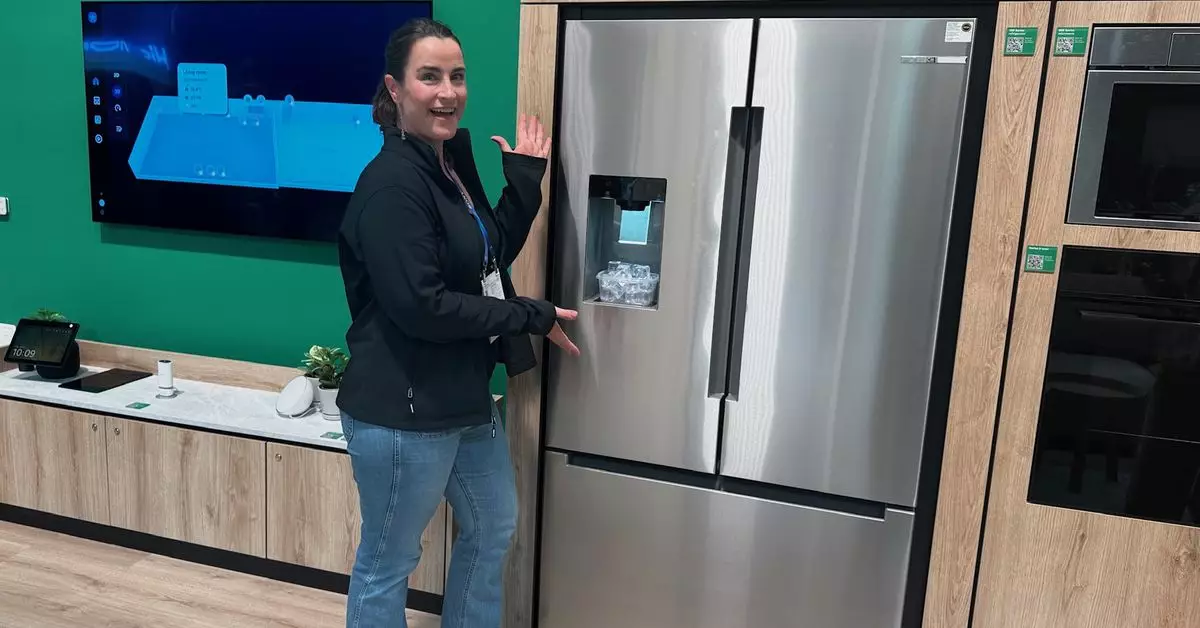As smart home technology continues to evolve, the push for interoperability among devices has become paramount. One initiative that has gained significant attention is Matter, a standard designed to facilitate communication between various smart home devices without the need for cloud reliance. Matter promotes secure and private connections, with the intent of creating an ecosystem where devices can seamlessly interact regardless of their manufacturer. Developed by industry heavyweights like Apple, Amazon, Google, and Samsung, Matter represents a concerted effort to improve user experience and reliability across smart home platforms. The significance of this standard is further emphasized by its broad applicability, extending to everything from refrigerators to smoke detectors.
Bosch has emerged as a frontrunner in the implementation of Matter technology within kitchen appliances, recently unveiling its 100 Series French Door Bottom Mount Refrigerator at the CES event. This innovative appliance is more than just a simple fridge—it is a sophisticated piece of technology that integrates with the Matter protocol, allowing homeowners to manage it flexibly and securely via their chosen smart home ecosystem. Set to retail for approximately $2,500 when it launches in the US this spring, the 100 Series marks Bosch’s commitment to leading the smart appliance revolution.
This refrigerator is not just compatible with Matter; it will enhance user interaction through features like temperature control via remote access and real-time notifications through connected smart home platforms. Users can expect their smart speaker to alert them if the refrigerator door has been left ajar or if other important notifications arise. While smart fridges have already incorporated such functionalities, Bosch’s adherence to the Matter standard ensures these interactions will be executed with increased speed and security—two crucial factors in today’s fast-paced technological environment.
The implications of Bosch’s Matter-enabled refrigerator extend beyond its immediate features. Eelco Lammertink of BSH (Bosch, Siemens, Thermador, Gaggenau) has articulated a broader vision that hints at a vast integration across various appliance categories. This year, Bosch aims to expand its Matter support beyond refrigeration to additional appliance categories, progressively building a comprehensive ecosystem through 2026. The focus, however, will remain on ensuring existing appliances are not retrofitted for Matter. Instead, Bosch is committed to continuous innovation with newly manufactured products only.
Such a strategy raises important questions among consumers who already own Bosch appliances that lack Matter support. The unwillingness to update older models can be seen as a missed opportunity, especially considering the growing consumer preference for interconnectedness and the convenience it offers. In a market increasingly influenced by smart technology, maintaining legacy products will be a balancing act for Bosch as demand for seamless experience rises.
Navigating the smart home landscape is undoubtedly complex, rife with challenges and competition. Currently, only specific platforms—Samsung SmartThings and Home Assistant—support Matter-enabled appliances. However, there is anticipation that Amazon will join this list shortly, which would significantly enhance Matter’s reach among smart home users. Sadly, there remains uncertainty regarding Google Home or Apple Home’s integration, which may leave some users feeling excluded from the Matter experience.
Moreover, while Matter aims to standardize communication across devices, each major platform still retains its unique ecosystem, which can lead to fragmentation. The prospect of owning Matter-enabled appliances that operate under a variety of systems remains hopeful, but the distinctive features and user-friendly setups of competing smart home platforms will influence consumer adoption and preference.
Bosch’s introduction of Matter-enabled appliances hints at a new era for smart home technology, one where devices from various manufacturers will communicate efficiently without the burden of a cloud-based dependency. As the smart home landscape matures, the challenge for companies like Bosch will be to ensure that they not only meet consumer needs in the present but also anticipate future demands for seamless interconnectivity and user-friendly functionality. The evolution is promising, and how consumers adapt to these innovations will shape the future of smart home living.

